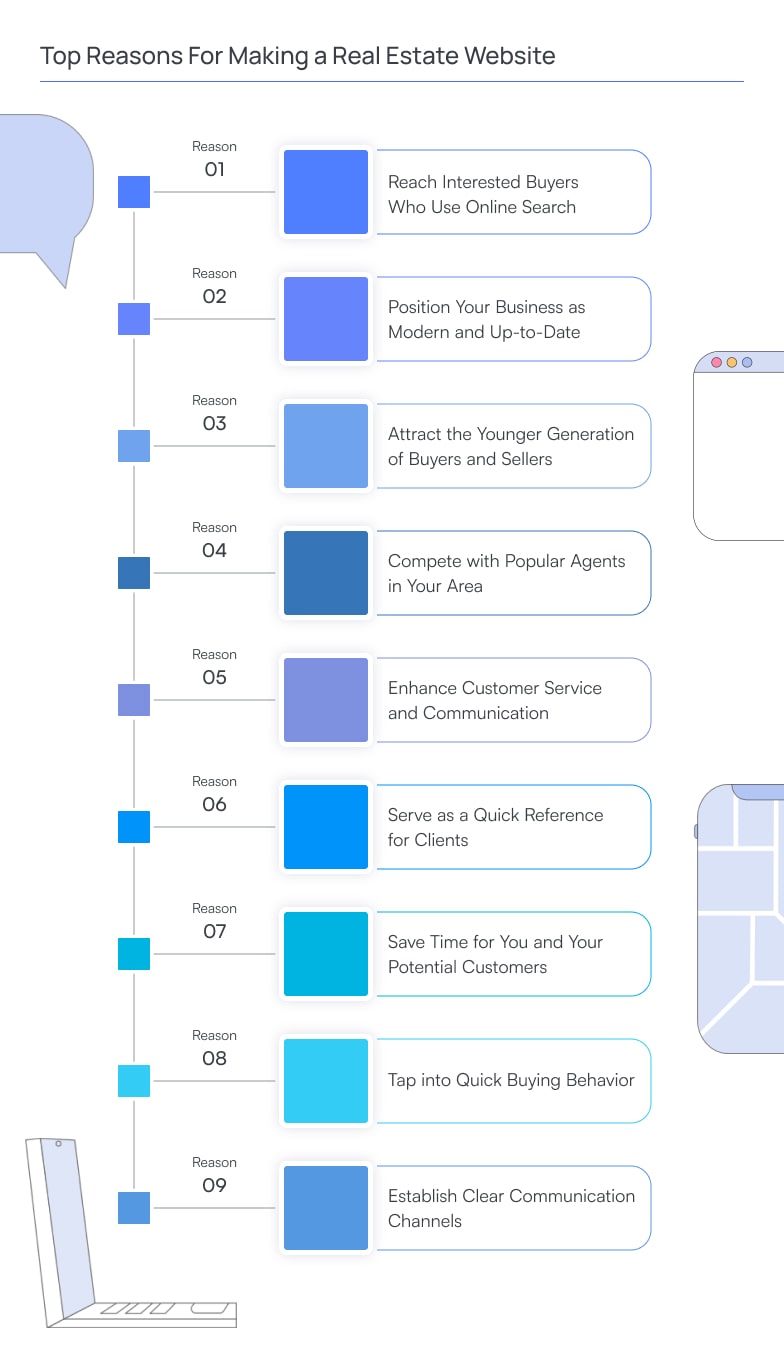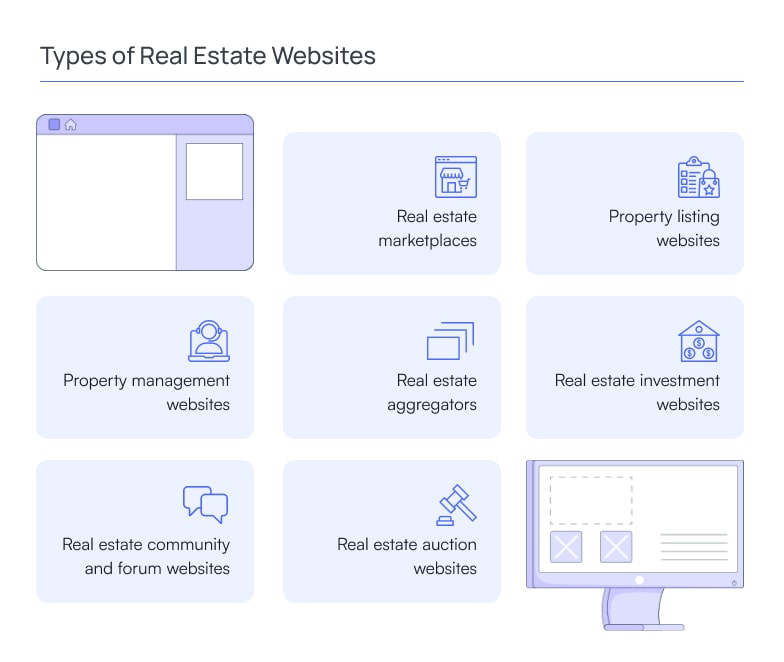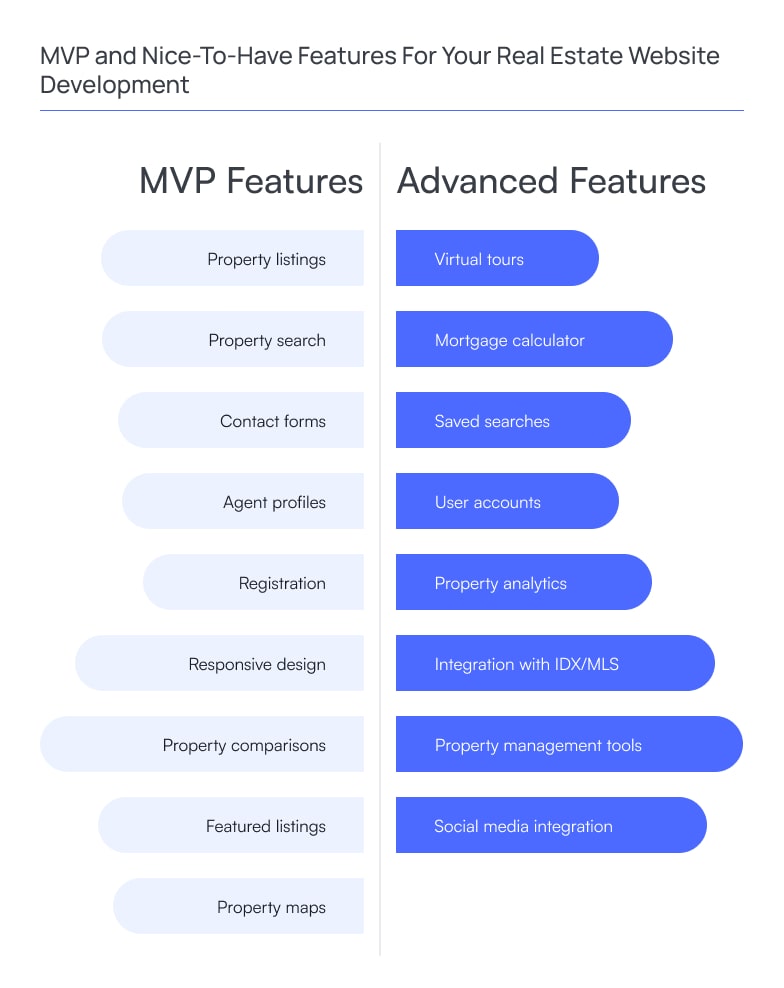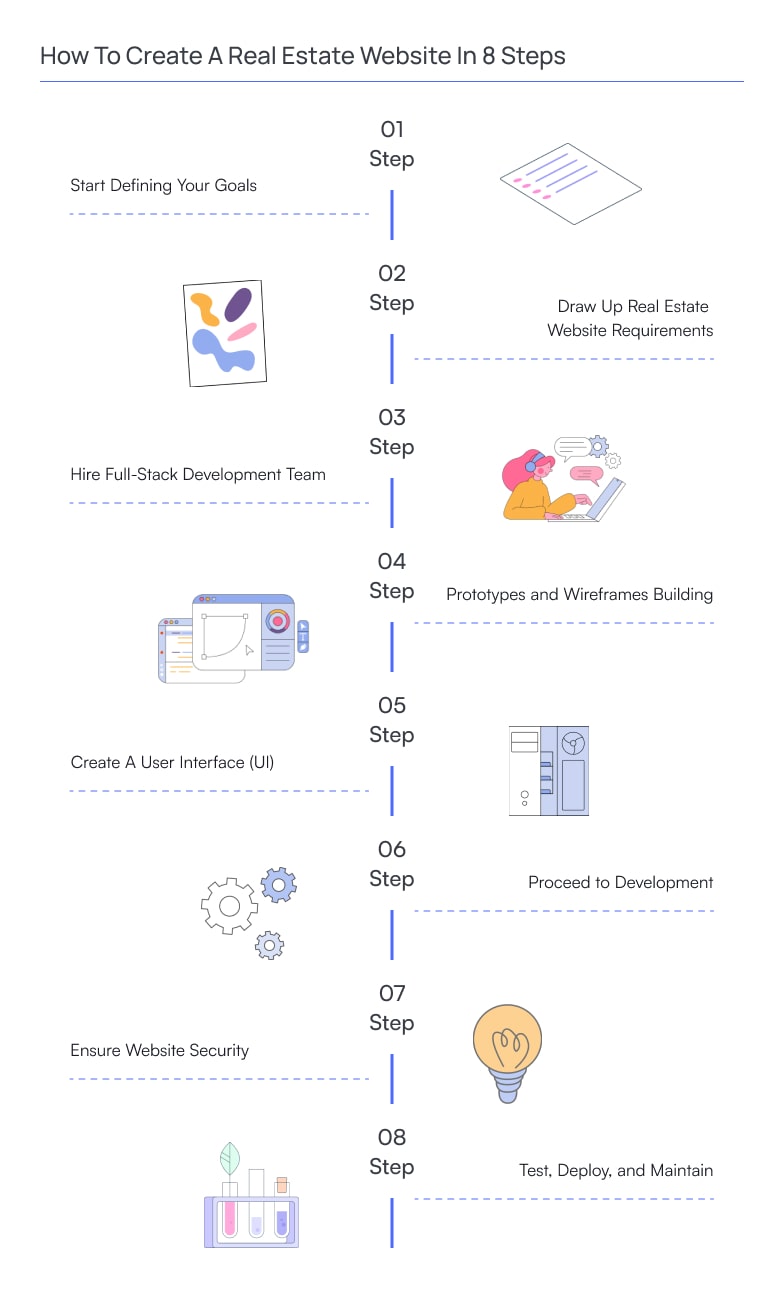In today’s digital age, having a strong online presence is crucial for real estate professionals and businesses to thrive. A well-designed and functional real estate website is a powerful tool for attracting potential buyers, connecting with clients, and effectively showcasing properties. Whether you’re a real estate agent, agency, or property management company, building a successful real estate website can significantly enhance your visibility, credibility, and, ultimately, your success in the industry.
However, creating a real estate website requires careful planning, strategic decision-making, and technical know-how. This comprehensive guide provides a step-by-step roadmap to develop a real estate website that meets your goals and exceeds your target audience’s expectations. From defining your objectives and identifying your target market to designing a user-friendly interface and implementing advanced features, each step plays a vital role in the website’s success.
Whether starting from scratch or looking to revamp your existing real estate website, this guide will equip you with the knowledge and insights to make informed decisions and build a website that showcases your properties and establishes a strong online presence for your brand. So, let’s dive in and uncover the essential steps to building a successful real estate website that captivates your audience and drives your business forward.
Top Reasons For Making a Real Estate Website
It is crucial to understand why it is better to have a real estate website built from scratch. You must recognize website development for real estate if you want to succeed and remain competitive in the market.

Reach Interested Buyers Who Use Online Search
Studies show that approximately 75% of home buyers search online for their desired properties. Having a real estate website lets you tap into this vast pool of potential clients. A website provides an opportunity to be discovered by more interested buyers who may find your services valuable.
Position Your Business as Modern and Up-to-Date
The Internet is synonymous with new and modern experiences. With a website, your real estate business can be fresh and exciting. A website gives prospective clients the impression that your business is updated with the latest trends and technologies, enhancing your reputation in the industry.
Attract the Younger Generation of Buyers and Sellers
Establishing an online presence is essential to target the promising demographic of young adults. Having your website increases the likelihood of young property buyers discovering your services. By reaching out to this tech-savvy generation, you can expand your client base and stay relevant in the competitive real estate market.
Compete with Popular Agents in Your Area
In the online world, size matters less than the quality of your website. By creating a professional and visually attractive website with relevant information, you can compete with even the most popular real estate agents in your area.
As your website grows and reaches more people, you can establish a strong online business identity and stand out.
Enhance Customer Service and Communication
A website offers various communication channels, ensuring you are readily available for your clients. Directing prospects to online communication tools such as contact forms or email provides convenient and efficient ways to connect. Having a website assures your customers that you can deliver the best possible service to them.
Serve as a Quick Reference for Clients
Your website is a comprehensive online marketing brochure. Clients can visit your website to learn more about your services and unique advantages over competitors and easily find your contact information. Let your website serve as a valuable resource for clients to obtain the information they need, showcasing your expertise and professionalism.
Save Time for You and Your Potential Customers
When creating a real estate website, you can provide essential information about your services without needing in-person meetings. It saves both you and your clients valuable time. By ensuring your website content is complete, clients can visit your site to access the information they require, while you can efficiently communicate with them through online forms or email.
Tap into Quick Buying Behavior
Online users tend to make faster purchasing decisions, which applies to real estate. A strong online presence makes potential customers more likely to find your services and properties for sale. Position yourself prominently online, enabling prospective customers to discover and contact you promptly.
Establish Clear Communication Channels
Online channels of communication offer distinct advantages over face-to-face or phone-only interactions. They provide a better way to record conversations, ensuring all details are noticed and remembered. Whether through online forms on your real estate website or email exchanges, online communication offers a secure and efficient platform for you and your clients to discuss transactions and communicate effectively.
Types of Real Estate Websites
The digital transformation in the real estate industry began with basic promotional websites. However, as the online business market evolves, businesses have numerous opportunities. Integration of web platforms has provided a significant boost to marketing strategies. Select the most suitable option for your web platform to maximize your success.

Real estate marketplaces. These online platforms facilitate smooth transactions and service exchanges between realtors, brokers, property managers, and customers. They provide easy-to-use real estate services, conveniently connecting buyers and sellers.
Property listing websites. These websites serve the purpose of showcasing properties for sale or rent to potential buyers and tenants. They offer extensive property information, including images, videos, and features, allowing users to explore properties virtually before scheduling live tours. Additionally, they serve as a marketing channel for realtors, mortgage professionals, banks, and inspectors to generate leads and find new clients.
Property management websites. Managing properties for rent or sale involves various tasks, such as marketing vacant properties, conducting tenant background checks, providing virtual or on-site property tours, lease management, rent collection, and repairs. Property management websites offer tools and solutions to streamline these tasks, reducing headaches for property owners and managers.
Real estate aggregators. These websites gather information from multiple sources, processing vast amounts of data and presenting it on a single platform. Users can search for properties based on their preferences, saving time by filtering the needed information. Real estate aggregators simplify the property search process, making it easier and more efficient for users.
Real estate investment websites. They cater to investors looking for investment opportunities in the real estate market. They provide information on investment options, market trends, property analysis tools, and resources to support investment decision-making.
Real estate community and forum websites. Platforms that bring together individuals interested in real estate to engage in discussions, share experiences, ask questions, and seek advice from fellow community members. They facilitate networking and knowledge sharing within the real estate community.
Real estate auction websites. These platforms specialize in conducting real estate auctions, selling properties to the highest bidder. They provide details of upcoming auctions, property descriptions, bidding procedures, and terms and conditions for interested buyers.
Ways To Monetize Your Real Estate Website
Of course, no one wants to build software and waste money for nothing. Website or mobile app should be profitable. By the way, the real estate mobile app development process is different, so hurry up to find out more.
So there are several ways to make money from real estate website development. Here are some common methods.
Property Listings Fee
Charge real estate agents or property owners a fee to list their properties on your website. You can offer different packages or pricing tiers based on the level of exposure or additional services provided.
Advertising and Sponsorships
Generate revenue by displaying ads from relevant businesses like mortgage lenders, home improvement companies, or interior designers. You can also offer sponsorship opportunities for featured spots or sections on your website.
Referral Programs
Establish partnerships with mortgage brokers, home inspectors, or other service providers in the real estate industry. Earn a referral fee or commission when users on your website engage with these partners’ services.
Premium Memberships or Subscriptions
Offer premium features or exclusive content to users who subscribe or pay a recurring fee. It can include access to advanced property search options, market reports, or exclusive listings.
Affiliate Marketing
Promote relevant products or services through affiliate marketing. Earn a commission when users purchase or sign up for services through your website’s affiliate links.
Property Management Services
If you have the resources and expertise, you can offer property management services to property owners. It can include rent collection, tenant screening, property maintenance, and more.
Ready to provide exceptional user experiences and streamline your real estate processes? Let our team of experts guide you in creating a cutting-edge website
Contact BineralsMVP and Nice-To-Have Features For Your Real Estate Website Development
It’s important to note that the specific features may vary depending on the purpose and target audience of the real estate website. However, we will list the most widespread ones. And first, we will start with the primary features that must be included and then proceed to advanced features that may enhance your real estate website.

MVP Features
- Property listings. This feature showcases properties for sale or rent, including detailed descriptions, images, videos, and specifications.
- Property search. Search functionality allows users to filter properties based on criteria such as location, price range, property type, and more.
- Contact forms. These forms for potential buyers or tenants to inquire about properties or schedule viewings, enabling direct communication with the real estate agent or agency.
- Agent profiles. Real estate agents’ or brokers’ profiles or bios provide information about their experience, expertise, and contact details.
- Registration. When designing a real estate website, ensure the registration process is easy and quick. Allowing users to register or sign in with their Facebook, Google, or phone number can greatly enhance the user experience. Minimizing manual data entry can streamline the registration process and ensure a seamless journey for your users.
- Responsive design. Ensuring the website is optimized for various devices (desktop, mobile, tablet) to provide a seamless browsing experience for users.
- Property comparisons. A feature that allows users to compare multiple properties side by side, facilitating informed decision-making.
- Featured listings. Highlighting specific properties or promotions on the website’s homepage or designated sections to attract attention.
- Property maps. Integration of interactive maps to display property locations and nearby amenities, helping users assess the property’s neighborhood.
Advanced Features
- Virtual tours. Offering virtual or 3D tours of properties, allowing users to navigate through the property virtually and experience it in detail.
- Mortgage calculator. A tool that helps users estimate monthly mortgage payments based on property price, down payment, interest rate, and loan term.
- Saved searches. Users can save their property search preferences and receive email notifications when new properties matching their criteria become available.
- User accounts. Enabling users to create personalized accounts to save favorite properties, track property inquiries, and manage property alerts.
- Property analytics. Providing data and insights on property views, inquiries, and engagement to help real estate professionals understand user behavior and refine their marketing strategies.
- Integration with IDX/MLS. Integration with Internet Data Exchange (IDX) or Multiple Listing Service (MLS) to access a broader range of property listings from multiple sources.
- Property management tools. Additional features for property managers include rent collection, lease management, maintenance requests, and tenant communication.
- Social media integration. Integration with social media platforms to allow users to share property listings or follow real estate agencies for updates and news.
How To Create A Real Estate Website In 8 Steps
By following the steps below, you can successfully design, develop, and launch your real estate website and continue to maintain and improve it for optimal performance and user satisfaction.
Start Defining Your Goals
Start by developing a clear idea for your real estate website. Determine why you want to create the website and your ultimate goals. Defining your goals will help you create a plan and guide the entire development process.
Draw Up Real Estate Website Requirements
Document the requirements for your real estate website. It includes providing a complete project overview, identifying your main needs and goals, defining your target audience, specifying the desired features and functionality, considering aesthetic aspects, and addressing non-functional details. If you write everything down, it will simplify and speed up cooperation with a development company.
Hire Full-Stack Development Team
Find a reliable design and development team for real estate website building. Look for experienced professionals with a strong portfolio and positive feedback from previous clients. Utilize social networks, ranking sites, or ask for recommendations from colleagues and friends. Binerals can be your partner since we are skilled enough to build your website from scratch. Apart from the website, Binerals can help you with real estate CRM software development.
Prototypes and Wireframes Building
Here, our UI/UX designers focus on creating a user-friendly and intuitive design for your real estate website. They develop the information architecture to organize content and navigation effectively. Also, they create wireframes, which are simplified visual representations of page layouts and user interfaces, to refine the design concept.
Create A User Interface (UI)
This stage is also crucial. The UI design involves implementing the approved design concept, ensuring all elements are structured and interconnected, maintaining a consistent style, and focusing on important components. The UI should be visually appealing, user-friendly, and aligned with the overall user experience (UX) goals.
Proceed to Development
Developers start working on front-end and back-end development. Front-end development focuses on the visible, client-facing aspects of the website, ensuring the user interface functions correctly.
Back-end development involves server-side programming, database management, and integrations to support the website’s functionality.
Ensure Website Security
Security comes first. So developers implement SSL certification to secure data transmission between users and your website, ensuring their personal information remains protected.
Also, we recommend you use strong passwords, implement user authentication mechanisms, and enable regular backups to safeguard your website and its data.
Test, Deploy, and Maintain
QA engineers must thoroughly test your real estate website to identify and fix any bugs or issues. They conduct comprehensive testing to ensure the website functions properly across different devices and browsers. Once testing is complete, developers deploy the website to make it accessible.
Remember to provide ongoing maintenance and support to address any user problems, improve the website, and ensure its smooth operation over time.
Summing Up
In conclusion, creating a real estate website is a multifaceted process that requires careful planning, strategic thinking, and technical expertise. Following the steps outlined in this comprehensive guide, you can create a successful real estate website that effectively showcases properties, connects with clients, and drives business growth.
Remember, even when you know how to make a real estate website, it is not a one-time endeavor but an ongoing process. By staying informed about industry advancements, user expectations, and technological innovations, you can continue to refine and optimize your website to meet the evolving needs of your audience and stay ahead in the competitive real estate market.
Don't settle for an average real estate website. Stand out with a visually stunning, highly functional interface that leaves a lasting impact. Contact Binerals today!
Contact Binerals todayFAQ
How to monetize a real estate website?
Monetization methods for real estate websites include:
Property listings fee: Charge agents or owners to list properties on your website.
Advertising and sponsorships: Display relevant ads or offer sponsorship opportunities.
Referral programs: Earn fees or commissions by referring users to real estate-related services.
Premium memberships or subscriptions: Provide exclusive features or content for paying subscribers.
Affiliate marketing: Promote products/services and earn commissions through affiliate links.
Property management services: Offer services like rent collection and property maintenance.
What are the reasons for real estate website development from scratch?
When you create a real estate website from scratch tailored to your business needs, you reach Interested buyers online, position your business as modern, attract the younger generation, compete with other real estate professionals, and improve customer service.
Moreover, your website acts as a comprehensive online marketing brochure, allowing clients to quickly access information about your services, advantages, and contact details. You save time for customers, and creating a strong online presence increases the chances of potential customers finding and contacting you promptly. Finally, you establish clear communication channels.
Why is having a user-friendly interface important for a real estate website?
A user-friendly interface is crucial for a real estate website as it enhances the user experience. It allows visitors to navigate the site effortlessly, find desired properties quickly, and access relevant information easily. A well-designed interface improves engagement, builds trust, and increases the likelihood of users staying on the website and taking desired actions, such as contacting agents or exploring listings.
